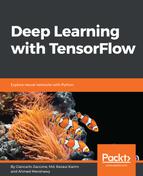Here we report the entire source code for the implemented bidirectional RNN:
import tensorflow as tf
from tensorflow.contrib import rnn
import numpy as np
from tensorflow.examples.tutorials.mnist import input_data
mnist = input_data.read_data_sets("/tmp/data/", one_hot=True)
learning_rate = 0.001
training_iters = 100000
batch_size = 128
display_step = 10
n_input = 28
n_steps = 28
n_hidden = 128
n_classes = 10
x = tf.placeholder("float", [None, n_steps, n_input])
y = tf.placeholder("float", [None, n_classes])
weights = {
'out': tf.Variable(tf.random_normal([2*n_hidden, n_classes]))
}
biases = {
'out': tf.Variable(tf.random_normal([n_classes]))
}
def BiRNN(x, weights, biases):
x = tf.transpose(x, [1, 0, 2])
x = tf.reshape(x, [-1, n_input])
x = tf.split(axis=0, num_or_size_splits=n_steps, value=x)
lstm_fw_cell = rnn_cell.BasicLSTMCell(n_hidden, forget_bias=1.0)
lstm_bw_cell = rnn_cell.BasicLSTMCell(n_hidden, forget_bias=1.0)
try:
outputs, _, _ = rnn.static_bidirectional_rnn(lstm_fw_cell,
lstm_bw_cell, x, dtype=tf.float32)
except Exception:# Old TensorFlow version returns output not states
outputs = rnn.bidirectional_rnn(lstm_fw_cell, lstm_bw_cell,
x, dtype=tf.float32)
return tf.matmul(outputs[-1], weights['out']) + biases['out']
pred = BiRNN(x, weights, biases)
New: cost = tf.reduce_mean(tf.nn.softmax_cross_entropy_with_logits(logits=pred, labels=y))
optimizer = tf.train.AdamOptimizer(learning_rate=learning_rate).minimize(cost)
correct_pred = tf.equal(tf.argmax(pred,1), tf.argmax(y,1))
accuracy = tf.reduce_mean(tf.cast(correct_pred, tf.float32))
init = tf.global_variables_initializer()
with tf.Session() as sess:
sess.run(init)
step = 1
while step * batch_size < training_iters:
batch_x, batch_y = mnist.train.next_batch(batch_size)
batch_x = batch_x.reshape((batch_size, n_steps, n_input))
sess.run(optimizer, feed_dict={x: batch_x, y: batch_y})
if step % display_step == 0:
acc = sess.run(accuracy, feed_dict={x: batch_x, y: batch_y})
loss = sess.run(cost, feed_dict={x: batch_x, y: batch_y})
print("Iter " + str(step*batch_size) + ", Minibatch Loss=
" +
"{:.6f}".format(loss) + ", Training Accuracy= " +
"{:.5f}".format(acc))
step += 1
print("Optimization Finished!")
test_len = 128
test_data = mnist.test.images[:test_len].reshape((-1, n_steps,
n_input))
test_label = mnist.test.labels[:test_len]
print("Testing Accuracy:",
sess.run(accuracy, feed_dict={x: test_data, y: test_label}))
